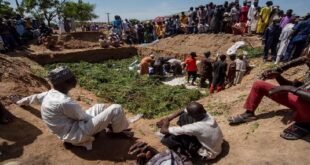29 July, 2019
BEIJING: The Chinese government has accused pro-democracy protesters in Hong Kong of committing “evil and criminal acts” that have seriously damaged the semi-autonomous city’s “reputation” and “stability.”
 At a press conference in Beijing on Monday, Hong Kong and Macau Affairs Office spokesman Yang Guang called the situation in Hong Kong “grave,” adding that Beijing would not allow any challenge to the Chinese government’s authority or threats to national security.
At a press conference in Beijing on Monday, Hong Kong and Macau Affairs Office spokesman Yang Guang called the situation in Hong Kong “grave,” adding that Beijing would not allow any challenge to the Chinese government’s authority or threats to national security.
“No civilization or society under the rule of law would ever allow acts of violence to take place. We call on the general public of Hong Kong to be aware of the grave nature of the current situation,” Yang said, calling on Hong Kong citizens to condemn protester violence.
“Hong Kong is China’s Hong Kong. Hong Kong’s affairs are China’s domestic affairs,” he added. Hong Kong has been governed under a ” one country, two systems” model since the city transferred from British to Chinese rule in 1997.
 It was the first time China’s top Hong Kong policy office had given a briefing on the mass demonstrations that began in early June in opposition to a controversial — and now-shelved — bill that would have allowed extradition from the city to mainland China.
It was the first time China’s top Hong Kong policy office had given a briefing on the mass demonstrations that began in early June in opposition to a controversial — and now-shelved — bill that would have allowed extradition from the city to mainland China.
Yang also used the event as an opportunity to reaffirm China’s strong support for Hong Kong’s leader, Chief Executive Carrie Lam, and the city’s police force, which has been the target of many protesters’ ire for deploying what they believe to be heavy-handed tactics.
Jimmy Shum, of the Civil Human Rights Front, which has organized many official protests in recent weeks, called the press conference “disappointing”:
“As an agency with the power to dismiss Carrie Lam, it did not call for her to step down. So the press conference wasted Hong Kong people 40 minutes of their time,” Shum said.
Eight weeks of unrest
 Mass protests have now been happening in Hong Kong, a major global financial hub, for eight consecutive weeks.
Mass protests have now been happening in Hong Kong, a major global financial hub, for eight consecutive weeks.
Protesters’ demands over that period have broadened to encompass issues such as greater democracy for the city, an inquiry into alleged police brutality and the resignation of Lam.
The demonstrations have also steadily escalated in terms of violence and rhetoric.
On July 1, protesters trashed the hong Kong Legislative Council offices, the city’s seat of government. On July 21, an armed mob at Yuen Long train station, in the north of the city, attacked people in a subway station, many of whom were protesters returning from a march police had broken up in the central Hong Kong. The mob was wearing white, while most of the demonstrators were clad in black, the color of the protest movement.
 Last Saturday, protesters staged a march in the small town of Yuen Long, near Hong Kong’s border with China, where they clashed with riot police. On Sunday night, much of downtown came to a standstill after riot police fired tear gas and rubber bullets at protesters who had defied a police ban to march through the city.
Last Saturday, protesters staged a march in the small town of Yuen Long, near Hong Kong’s border with China, where they clashed with riot police. On Sunday night, much of downtown came to a standstill after riot police fired tear gas and rubber bullets at protesters who had defied a police ban to march through the city.
Beijing has previously denounced the protesters in state media, including their decision to target the Chinese government’s headquarters in the city on July 21. State-run news agency Xinhua called the demonstrators “radical protesters” and said their actions were an “open challenge to the central government’s authority.”
“If this can be tolerated, what can not?” Chinese Communist Party mouthpiece People’s Daily said in an editorial.
 At a Ministry of Defense briefing last week, spokesperson Wu Qian said the Chinese military was watching the situation in Hong Kong closely.
At a Ministry of Defense briefing last week, spokesperson Wu Qian said the Chinese military was watching the situation in Hong Kong closely.
When asked if the Chinese military would intervene, Wu referenced a law that allows the Hong Kong government to request assistance to maintain public order from Beijing’s military garrison in the city — a point Yang repeated at Monday’s press conference when asked by CNN. (Int’l News Desk)
 Pressmediaofindia
Pressmediaofindia




